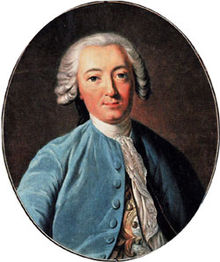Claude Adrien Helvétius
Appearance

Claude Adrien Helvétius (26 January or 26 February 1715 (sources differ) – 26 December 1771) was a French philosopher and littérateur.
Quotes
[edit]De l'esprit or, Essays on the Mind, and Its Several Faculties (1758)
[edit]- English translation by William Mudford, 1807
- All men have an equal disposition for understanding.
- p. 286
- No nation has reason to regard itself superior to others by virtue of its innate endowment.
- p. 21
- Discipline is, in a manner, nothing else but the art of inspiring the soldiers with greater fear of their officers than of the enemy. This fear has often the effect of courage: but it cannot prevail against the fierce and obstinate valor of people animated by fanaticism, or warm love of their country.
- …there are men whom a happy disposition, a strong desire of glory and esteem, inspire with the same love for justice and virtue, which men in general have for riches and honours.
- The actions personally advantageous for these virtuous men are so truly just, that they tend to promote the general welfare, or, at least, not to lessen it.
- But the number of these men is so small, that I only mention them in honour of humanity.
- Most events spring from causes equally small: we are unacquainted with them because most historians have been themselves ignorant of them, or have not had eyes capable of perceiving them. It is true, that, in this respect, the mind may repair their omissions; for the knowledge of certain principles easily compensates the lack of knowledge of certain facts.
- La plupart des évènements ont des causes aussi petites. Nous les ignorons, parce que la plupart des historiens les ont ignorées eux-mêmes, ou parce qu’ils n’ont pas eu d’yeux pour les appercevoir. Il est vrai qu’à cet égard l’esprit peut réparer leurs omissions : la connoissance de certains principes supplée facilement à la connoissance de certains faits.
- Essay III, Chapter I
- The degree of genius necessary to please us is pretty nearly the same proportion that we ourselves have.
- Essay II, Chapter X, note.
A Treatise on Man: His Intellectual Faculties & His Education, Vol. I (1773)
[edit]- De l'homme, de ses facultés intellectuelles et de son éducation (posth., 1773); English translation by W. Hooper, 1777
- To limit the press is to insult a nation; to prohibit reading of certain books is to declare the inhabitants to be either fools or slaves: such a prohibition ought to fill them with disdain.
- En anéantissant les désirs, on anéantit l'âme, & tout homme sans passion n'a en lui ni principe d'action, ni motif pour se mouvoir.
- By annihilating the desires, you annihilate the mind. Every man without passions has within him no principle of action, nor motive to act.


